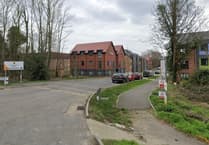AS workers in various industries continue to strike in the UK over pay and working conditions, the list of those participating in industrial action is expected to grow – including in Surrey and Hampshire.
In the coming weeks, strikes will affect train services, postal deliveries, hospital care, ambulance services, bus drivers, driving examiners, highway workers, and Border Force officials – with others such as teachers and firefighters considering strike action later in the year.
Nurses
The Royal College of Nurses (RCN) has announced further strikes on January 18 and 19, after previously striking on December 15 and 20.
But nurses at St Peter's Hospital, Ashford Hospital and Royal Surrey County Hospital did not take part in the December walkout after RCN members at those NHS trusts didn’t meet the 50 per cent turnout threshold required by law – and are not expected to join the January walkouts either.
Those trust members who did vote in December voted "overwhelmingly" for strike action though, said the RCN union, which is seeking a 19 per cent pay increase and has accused the government of not opening talks on the matter.
The government in England has said that the 4.75 per cent average pay increase given to NHS staff this year is in line with the recommendation from the NHS Pay Review Body made in July.
Ambulance staff
Some ambulance staff in England – but not those employed by South East Coast and South Central NHS ambulance services – will also participate in strikes on January 11 and 23, following previous strikes on December 21.
Staff at South East Coast and South Central did take part in the December walkout. But only staff employed by London, Yorkshire, North West, North East and South West ambulance services will take part in this month's industrial action.
The strikes will only affect non-life threatening calls and the unions have requested above-inflation pay increases. The governments in England and Wales have given NHS staff an average pay increase of 4.75 per cent.
Rail workers
The National Union of Rail, Maritime and Transport Workers (RMT) is holding strikes on January 6 to 7, tomorrow and Saturday, following strike action on Wednesday
In addition, train drivers across 15 rail companies – including South Western Railway (SWR) – are striking today, according to the Aslef union.
As a result, SWR has warned customers to only travel if "absolutely necessary" between January 3 and 8, and to check before they travel.
A severely reduced service will operate on the strike days between 7.15am and 6.30pm on a limited number of routes between Waterloo and Windsor, Basingstoke, Woking and Southampton only.
There will be no trains on the Waterloo to Alton and Portsmouth lines, affecting commuters in Alton, Bentley, Farnham, Petersfield, Liss, Liphook, Haslemere and Witley, from now to January 7.
The RMT is seeking a pay offer that reflects the rising cost of living and a guarantee of no compulsory job losses. Rail industry bosses have stated that changes must be agreed upon in order to afford pay increases and modernise the railway.
Bus workers
A number of strikes have already taken place in December and eight more are planned for January involving bus drivers working for Abellio and Metroline – but Stagecoach South has not yet been affected by industrial action.
The Unite union is requesting a pay increase to reflect the higher cost of living. Transport for London has urged Unite and the Abellio bus company to work together to avoid disruption.
Driving examiners
There are delays for learner drivers seeking to book their tests, with driving examiners to participate in rolling strikes until January 16. The Public and Commercial Services Union is calling for a 10 per cent pay increase, better pensions, job security, and no cuts to redundancy terms. The government has stated that the strike may affect driving tests but not theory tests.
Teachers
A new wave of teacher strikes is currently only affecting schools and colleges in Scotland, where teachers will participate in another strike on January 10 and 11. A 6.85 per cent increase for the lowest paid was rejected, with teachers arguing for a 10 per cent increase. However, teaching unions in England and Wales are currently balloting members over pay, which could lead to strikes.
Border Force
Approximately 1,000 Border Force staff participated in strikes from December 23 to 26 and December 28 to 31. Officials checking passports for those arriving in the UK were among those involved in the dispute. The officers, who are part of the PCS, are striking over pay, pensions, and jobs.
Firefighters
Firefighters and control staff in the UK are being balloted on potential strike action over what the Fire Brigades Union says is a "derisory" five per cent pay offer, which was rejected by 79 per cent of members in a consultative ballot.
The ballot, which is being conducted by post because of restrictive anti-trade union laws, opened on December 5 and will close on January 30.
If a national strike were to occur, it would be the first on pay since 2002-2003 and the first national strike since pension action between 2013 and 2015, which did not include control staff.
The current annual consumer price index (CPI) inflation rate is 11.1 per cent. The Fire Brigades Union (FBU) has urged members to send in their ballots now due to the impact of strikes on Royal Mail.



.jpeg?width=209&height=140&crop=209:145,smart&quality=75)

Comments
This article has no comments yet. Be the first to leave a comment.